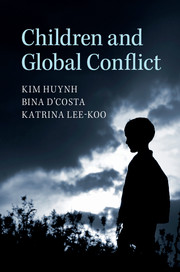Book contents
- Frontmatter
- Dedication
- Contents
- List of abbreviations
- Introduction: why children matter to global conflict
- 1 Children and armed conflict: mapping the terrain
- 2 Children and agency: caretakers, free-rangers and everyday life
- 3 Children and IR: creating spaces for children
- 4 The rights of the child: political history, practices and protection
- 5 Child soldiers: causes, solutions and cultures
- 6 Child forced migrants: bio-politics, autonomy and ambivalence
- 7 Children and peace building: propagating peace
- 8 Children and justice: past crimes, healing and the future
- 9 Who speaks for children? Advocacy, activism and resistance
- Conclusion
- Appendix
- Bibliography
- Index
3 - Children and IR: creating spaces for children
Published online by Cambridge University Press: 05 May 2015
- Frontmatter
- Dedication
- Contents
- List of abbreviations
- Introduction: why children matter to global conflict
- 1 Children and armed conflict: mapping the terrain
- 2 Children and agency: caretakers, free-rangers and everyday life
- 3 Children and IR: creating spaces for children
- 4 The rights of the child: political history, practices and protection
- 5 Child soldiers: causes, solutions and cultures
- 6 Child forced migrants: bio-politics, autonomy and ambivalence
- 7 Children and peace building: propagating peace
- 8 Children and justice: past crimes, healing and the future
- 9 Who speaks for children? Advocacy, activism and resistance
- Conclusion
- Appendix
- Bibliography
- Index
Summary
Introduction
Armed conflict is one of the central considerations of the discipline of IR. Yet, IR has demonstrated no curiosity concerning the impact of conflict on children, or, alternatively, children's impact on conflict. This is in spite of the fact that, as noted in the Introduction, UNICEF calculates that around one billion children currently live in conflict zones. IR, which has remained largely silent on this issue, is therefore an outlier with respect to other social science disciplines such as sociology, anthropology, philosophy and social work, all of which have made significant contributions to the contemporary understanding of children in conflict zones. Watson notes that the discipline of IR is unique within the social sciences for its neglect of children. She writes that ‘no international relations theory currently makes any specific reference to children as actors’.
This chapter investigates the relationship between children and the disciplinary study of IR in relation to the discipline's core concerns of conflict, peace and security. To this end, it focuses upon three theoretical traditions: realism, liberalism and critical approaches to IR. It considers the theoretical contribution of these traditions within contemporary conflict and the prevalence of so-called ‘new wars’, whose non-traditional features challenge conventional understandings of war as a clearly defined state-against-state enterprise. While this is only a snapshot of the rich and complex theoretical tradition in IR's study of conflict, it nonetheless provides an analysis of a dominant orthodox tradition and powerful contemporary critique. Realism's analysis of conflict, contemporary ideas of the liberal peace and critical approaches to IR's re-visioning of conflict analysis currently dominate IR debates with regard to conflict. While these approaches have made important contributions to the study of conflict analysis, it is worth noting that none of these traditions have explicitly developed either a significant body of work or dedicated theorising on the role that children play in conflict zones. However, despite this explicit silence, implicit theorising on the relationship that children have with conflict can be detected in each approach.
Information
- Type
- Chapter
- Information
- Children and Global Conflict , pp. 65 - 88Publisher: Cambridge University PressPrint publication year: 2015
Accessibility standard: Unknown
Why this information is here
This section outlines the accessibility features of this content - including support for screen readers, full keyboard navigation and high-contrast display options. This may not be relevant for you.Accessibility Information
- 1
- Cited by
